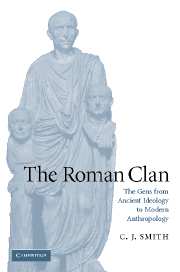Book contents
- Frontmatter
- Contents
- List of illustrations
- Preface
- List of abbreviations
- General introduction
- Part I THE EVIDENCE FOR THE GENS
- Part II TOWARDS AN INTERPRETATION OF THE GENS
- Chapter 5 The Roman community
- Chapter 6 The Roman curiae
- Chapter 7 The patricians and the land
- Chapter 8 The patriciate
- Chapter 9 Warfare in the regal and early Republican periods
- Chapter 10 Explaining the gens
- Chapter 11 Roman history and the modern world
- Appendix 1 Dionysius of Halicarnassus on the Roman curiae and religion
- Appendix 2 The missing curiae
- Select bibliography
- General index
- Index of ancient persons
- Index of passages discussed
Chapter 10 - Explaining the gens
Published online by Cambridge University Press: 22 September 2009
- Frontmatter
- Contents
- List of illustrations
- Preface
- List of abbreviations
- General introduction
- Part I THE EVIDENCE FOR THE GENS
- Part II TOWARDS AN INTERPRETATION OF THE GENS
- Chapter 5 The Roman community
- Chapter 6 The Roman curiae
- Chapter 7 The patricians and the land
- Chapter 8 The patriciate
- Chapter 9 Warfare in the regal and early Republican periods
- Chapter 10 Explaining the gens
- Chapter 11 Roman history and the modern world
- Appendix 1 Dionysius of Halicarnassus on the Roman curiae and religion
- Appendix 2 The missing curiae
- Select bibliography
- General index
- Index of ancient persons
- Index of passages discussed
Summary
INTRODUCTION
The previous chapters have had three objectives: first, to reinstate the curiae properly in the discourse on early Rome, by examining their nature, functions and privileges; second, to examine the nature and privileges of the patriciate, in the context of the Struggle of the Orders; and third, to pose a problem over the apparently fractured and fracturing nature of Roman society, and its surprising cohesion and success. I have laid heavy emphasis on the proclaimed privileges of the patriciate, but have been dubious about the grounds for those privileges. In other words, I have suggested that the patriciate is a fiction of its own making, and claims and counterclaims about it should be seen in terms of an argument, and not as statements of fact. Moreover, it is not clear that the patriciate emerged into the Republican period with these arguments already developed, or that it was successful in maintaining the privileges it claimed in the fifth and fourth centuries. The long history of the military tribunes with consular imperium for instance may reflect a long period of uncertainty over the justification of patriciate control of office.
In terms of the cohesiveness or otherwise of Roman society, the army provides an obvious case-study.
- Type
- Chapter
- Information
- The Roman ClanThe Gens from Ancient Ideology to Modern Anthropology, pp. 299 - 335Publisher: Cambridge University PressPrint publication year: 2006

